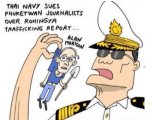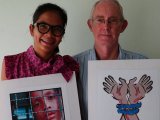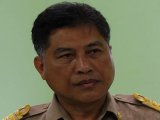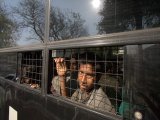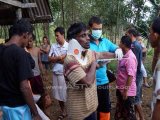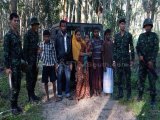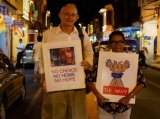PHUKET: Reports that Thailand is addressing the issue of human trafficking are premature, Phuketwan journalists have concluded after another year of tracking the arrival of boatpeople in Thailand.
While the importance of action on the issue is now more clearly understood at the highest levels of government, little has changed at the implementation level.
The most encouraging sign has come from a district chief north of Phuket, where Manit Pleantong and his band of volunteers have taken action into their own hands to halt human trafficking in and around the town of Takuapa.
Phuketwan journalists recently witnessed armed volunteers arresting suspected traffickers and over the past few months have seen the local vigilantes apprehend truckloads of boatpeople and interrogate them themselves.
However, while one group of arrivals from the same boat can be determined illegal immigrants and another group can be determined human trafficking victims, it's plain the present system in Thailand needs more work.
For years, local police and other officials have either turned a blind eye to the illegal but lucrative transfers to brutal jungle camps on the Thai-Malaysia border or declared apprehended boatpeople to be illegal immigrants.
This makes processing easy and saves the trouble of having to find space to accommodate them and a budget to feed them indefinitely.
Thanks to Khun Manit's vigilantes and his regular radio reports to locals on the need to stop this tacit human trafficking, awareness is growing rapidly.
But only when the words from the top have filtered down and all Andaman provinces enforce the laws efficiently and fairly to international standards will there be real signs of change in Thailand.
That said, Phuketwan's experience is confined to the Andaman coast. Improvements may already have been achieved in factories accused of using child workers or indentured foreign labor - we are unable to offer an opinion.
A reporter did ventured out last year into international waters, where fishing trawlers from Thailand, Malaysia and Indonesia sometimes stay for years.
The supply vessels that leave shore in Songhla province to carry out food and take back fish are crewed by legal Thai and Burmese workers.
We would suggest that if authorities are keen to obliterate slave labor from the fishing industry, they should spend their time boarding the trawlers in international waters.
At this time last year, when the Thai government issued statistics on arrests for trafficking, Phuketwan asked for the actual names of the people who had been arrested so the figures could be confirmed, and for case studies. We are still awaiting a response to that request.
One year on, similar media releases are now coming from the Thai embassy in Washington, as the US State Department assesses Thailand's efforts to lift itself rapidly from Tier 3 of the Trafficking in Persons report - the lowest level.
Our assessment is that Thailand must devote substantial budget to settling up a process for accurately determining whether new arrivals are illiegal immigrants or human trafficking victims and even more time and effort to accommodating those who prove to be genuine refugees.
Hope lies with the grassroots movement pioneered by Khun Manit and others. The sooner that attitude spreads to all Andaman coast districts, the better.
For his efforts, Khun Manit was judged to be Phuketwan's Person of the Year 2014.
Press Conference on Thailand's Trafficking in Persons 2014 Country Report
On 30 January 2015, Mr. Don Pramudwinai, Deputy Minister of Foreign Affairs, as Chairman of the National Sub-committee on Law, Partnership and Awareness Promotion on Trafficking in Persons, together with top officials from related line agencies, gave a press conference on Thailand's Trafficking in Persons 2014 Country Report, soon to be launched.
Thailand's Anti-Human Trafficking Act B.E. 2551 (2008) commits related line agencies to report annually on the country's progress and developments made in the efforts to combat human-trafficking through improved policies and deliverable measures, covering the 5Ps strategy of Policy, Prosecution, Protection, Prevention, and Partnership.
Since May 2014, the new administration and the subsequent Government have made combating trafficking in persons an integral part of their Reform Agenda.
As one of the top national priorities, this administration has increased the allocation of budget for the fiscal year 2015 (October 2014 to September 2015) to 496.82 million baht (or about 15.52 million USD), and declared zero tolerance to human trafficking and its nurturing conditions, including corruption and complicity of state officials.
General Prayut Chan-o-cha, Prime Minister, personally took charge of fighting the problem and instructed all line agencies to expedite their work in the utmost effective manner.
Special emphasis is given to punishing officials who are complicit in the crime. The Prime Minister has declared zero tolerance to human trafficking and the conditions that enable it.
Long-term solutions to address the problem at its root causes have also begun, such as developing Special Economic Zones along the border between Thailand and its neighbors in order to reduce the development gap between large urban areas and remote provinces.
The Government has made significant progress and achieved a number of tangible results in combating human trafficking.
Among the key achievements in 2014 highlighted in the report are:
(1) The government has reinforced and strengthened coordination and integration among public agencies in all dimensions, both at the policy level where the Prime Minister himself chaired the National Committee, and at the implementation levels, thereby increasing the effectiveness of combating the crime.
(2) The registration of about 1.6 million illegal migrant workers, through 87 registration centers country-wide, has helped to better protect these workers and lessen the chances of them falling prey to labor exploitation and human trafficking. The measure has also helped raise people's awareness of labor exploitation and human trafficking, and the penalties attached to it.
(3) Several laws and regulations have been improved to better address wide-ranging dimensions of human trafficking. There are more measures for protection, and the scope of prosecution has been broadened, for example:
- The Amendment of the Anti-Human Trafficking Act B.E. 2551 (2008) has been submitted by the Cabinet for the National Legislative Assembly's consideration to provide better protection to witnesses and officials on duty, while increasing penalties for human trafficking offenders;
- The Labor Ministerial Regulation to Protect Labor in the Sea Fishing Industry B.E. 2557 (2014) has been enacted to provide workers with better protection and better work conditions, and in particular to raise the minimum age of labor at sea to 18 years of age, thereby preventing exploitation of young people;
- Other laws have also been used to put pressure on human trafficking syndicates, such as anti-money laundering and anti-tax evasion laws, the monitoring of suspects on temporary bail, and the use of Provincial Governors' authority and administrative power to close down at-risk or involved venues of human trafficking.
(4) Legal proceedings and disciplinary punishment against government officials involved in human trafficking and illegal exploitation, or conspiring to the crime through negligence, have been increased. The government is also strengthening corruption-monitoring mechanisms, so that they can monitor and take disciplinary and criminal actions against corrupt officials without interference. In addition, legal actions have continued against llegal brokers and traffickers.
According to the statistics compiled so far, in 2014, 595 victims of trafficking in persons have been identified; 280 cases were investigated, 115 cases were prosecuted and 104 defendants were convicted; 5 employment agencies were punished while 134 cases of illegal brokers are being prosecuted. Furthermore, more complex cases are being investigated with cooperation between the government and the civil society organisations, leading to the rescue of victims and prosecution of 16 cases involving human trafficking syndicates.
(5) 24-hour Hotlines have been made available ('Dial 1300') to receive information on all kinds of complaints related to human trafficking, child labor, as well as domestic violence especially those against women and children, with interpreters in 5 languages (Burmese, Chinese, English, Khmer, Vietnamese). These channels, which in 2014 received more than 3,400 complaints, helped law enforcers identify 123 cases related to human trafficking and further investigate and apprehend perpetrators in high-profile cases.
Thailand recognises that, having made much progress in 2014, many challenges still remain to be dealt with. Our annual report on trafficking in persons therefore aims not only to explain the situation to the public, but also to stimulate government authorities to strive for better solutions.
With the leadership's strong commitment, Thailand will intensify its engagement and cooperation with a wider group of stakeholders in public and private sectors, both domestically and internationally.
While the importance of action on the issue is now more clearly understood at the highest levels of government, little has changed at the implementation level.
The most encouraging sign has come from a district chief north of Phuket, where Manit Pleantong and his band of volunteers have taken action into their own hands to halt human trafficking in and around the town of Takuapa.
Phuketwan journalists recently witnessed armed volunteers arresting suspected traffickers and over the past few months have seen the local vigilantes apprehend truckloads of boatpeople and interrogate them themselves.
However, while one group of arrivals from the same boat can be determined illegal immigrants and another group can be determined human trafficking victims, it's plain the present system in Thailand needs more work.
For years, local police and other officials have either turned a blind eye to the illegal but lucrative transfers to brutal jungle camps on the Thai-Malaysia border or declared apprehended boatpeople to be illegal immigrants.
This makes processing easy and saves the trouble of having to find space to accommodate them and a budget to feed them indefinitely.
Thanks to Khun Manit's vigilantes and his regular radio reports to locals on the need to stop this tacit human trafficking, awareness is growing rapidly.
But only when the words from the top have filtered down and all Andaman provinces enforce the laws efficiently and fairly to international standards will there be real signs of change in Thailand.
That said, Phuketwan's experience is confined to the Andaman coast. Improvements may already have been achieved in factories accused of using child workers or indentured foreign labor - we are unable to offer an opinion.
A reporter did ventured out last year into international waters, where fishing trawlers from Thailand, Malaysia and Indonesia sometimes stay for years.
The supply vessels that leave shore in Songhla province to carry out food and take back fish are crewed by legal Thai and Burmese workers.
We would suggest that if authorities are keen to obliterate slave labor from the fishing industry, they should spend their time boarding the trawlers in international waters.
At this time last year, when the Thai government issued statistics on arrests for trafficking, Phuketwan asked for the actual names of the people who had been arrested so the figures could be confirmed, and for case studies. We are still awaiting a response to that request.
One year on, similar media releases are now coming from the Thai embassy in Washington, as the US State Department assesses Thailand's efforts to lift itself rapidly from Tier 3 of the Trafficking in Persons report - the lowest level.
Our assessment is that Thailand must devote substantial budget to settling up a process for accurately determining whether new arrivals are illiegal immigrants or human trafficking victims and even more time and effort to accommodating those who prove to be genuine refugees.
Hope lies with the grassroots movement pioneered by Khun Manit and others. The sooner that attitude spreads to all Andaman coast districts, the better.
For his efforts, Khun Manit was judged to be Phuketwan's Person of the Year 2014.
Press Conference on Thailand's Trafficking in Persons 2014 Country Report
On 30 January 2015, Mr. Don Pramudwinai, Deputy Minister of Foreign Affairs, as Chairman of the National Sub-committee on Law, Partnership and Awareness Promotion on Trafficking in Persons, together with top officials from related line agencies, gave a press conference on Thailand's Trafficking in Persons 2014 Country Report, soon to be launched.
Thailand's Anti-Human Trafficking Act B.E. 2551 (2008) commits related line agencies to report annually on the country's progress and developments made in the efforts to combat human-trafficking through improved policies and deliverable measures, covering the 5Ps strategy of Policy, Prosecution, Protection, Prevention, and Partnership.
Since May 2014, the new administration and the subsequent Government have made combating trafficking in persons an integral part of their Reform Agenda.
As one of the top national priorities, this administration has increased the allocation of budget for the fiscal year 2015 (October 2014 to September 2015) to 496.82 million baht (or about 15.52 million USD), and declared zero tolerance to human trafficking and its nurturing conditions, including corruption and complicity of state officials.
General Prayut Chan-o-cha, Prime Minister, personally took charge of fighting the problem and instructed all line agencies to expedite their work in the utmost effective manner.
Special emphasis is given to punishing officials who are complicit in the crime. The Prime Minister has declared zero tolerance to human trafficking and the conditions that enable it.
Long-term solutions to address the problem at its root causes have also begun, such as developing Special Economic Zones along the border between Thailand and its neighbors in order to reduce the development gap between large urban areas and remote provinces.
The Government has made significant progress and achieved a number of tangible results in combating human trafficking.
Among the key achievements in 2014 highlighted in the report are:
(1) The government has reinforced and strengthened coordination and integration among public agencies in all dimensions, both at the policy level where the Prime Minister himself chaired the National Committee, and at the implementation levels, thereby increasing the effectiveness of combating the crime.
(2) The registration of about 1.6 million illegal migrant workers, through 87 registration centers country-wide, has helped to better protect these workers and lessen the chances of them falling prey to labor exploitation and human trafficking. The measure has also helped raise people's awareness of labor exploitation and human trafficking, and the penalties attached to it.
(3) Several laws and regulations have been improved to better address wide-ranging dimensions of human trafficking. There are more measures for protection, and the scope of prosecution has been broadened, for example:
- The Amendment of the Anti-Human Trafficking Act B.E. 2551 (2008) has been submitted by the Cabinet for the National Legislative Assembly's consideration to provide better protection to witnesses and officials on duty, while increasing penalties for human trafficking offenders;
- The Labor Ministerial Regulation to Protect Labor in the Sea Fishing Industry B.E. 2557 (2014) has been enacted to provide workers with better protection and better work conditions, and in particular to raise the minimum age of labor at sea to 18 years of age, thereby preventing exploitation of young people;
- Other laws have also been used to put pressure on human trafficking syndicates, such as anti-money laundering and anti-tax evasion laws, the monitoring of suspects on temporary bail, and the use of Provincial Governors' authority and administrative power to close down at-risk or involved venues of human trafficking.
(4) Legal proceedings and disciplinary punishment against government officials involved in human trafficking and illegal exploitation, or conspiring to the crime through negligence, have been increased. The government is also strengthening corruption-monitoring mechanisms, so that they can monitor and take disciplinary and criminal actions against corrupt officials without interference. In addition, legal actions have continued against llegal brokers and traffickers.
According to the statistics compiled so far, in 2014, 595 victims of trafficking in persons have been identified; 280 cases were investigated, 115 cases were prosecuted and 104 defendants were convicted; 5 employment agencies were punished while 134 cases of illegal brokers are being prosecuted. Furthermore, more complex cases are being investigated with cooperation between the government and the civil society organisations, leading to the rescue of victims and prosecution of 16 cases involving human trafficking syndicates.
(5) 24-hour Hotlines have been made available ('Dial 1300') to receive information on all kinds of complaints related to human trafficking, child labor, as well as domestic violence especially those against women and children, with interpreters in 5 languages (Burmese, Chinese, English, Khmer, Vietnamese). These channels, which in 2014 received more than 3,400 complaints, helped law enforcers identify 123 cases related to human trafficking and further investigate and apprehend perpetrators in high-profile cases.
Thailand recognises that, having made much progress in 2014, many challenges still remain to be dealt with. Our annual report on trafficking in persons therefore aims not only to explain the situation to the public, but also to stimulate government authorities to strive for better solutions.
With the leadership's strong commitment, Thailand will intensify its engagement and cooperation with a wider group of stakeholders in public and private sectors, both domestically and internationally.


